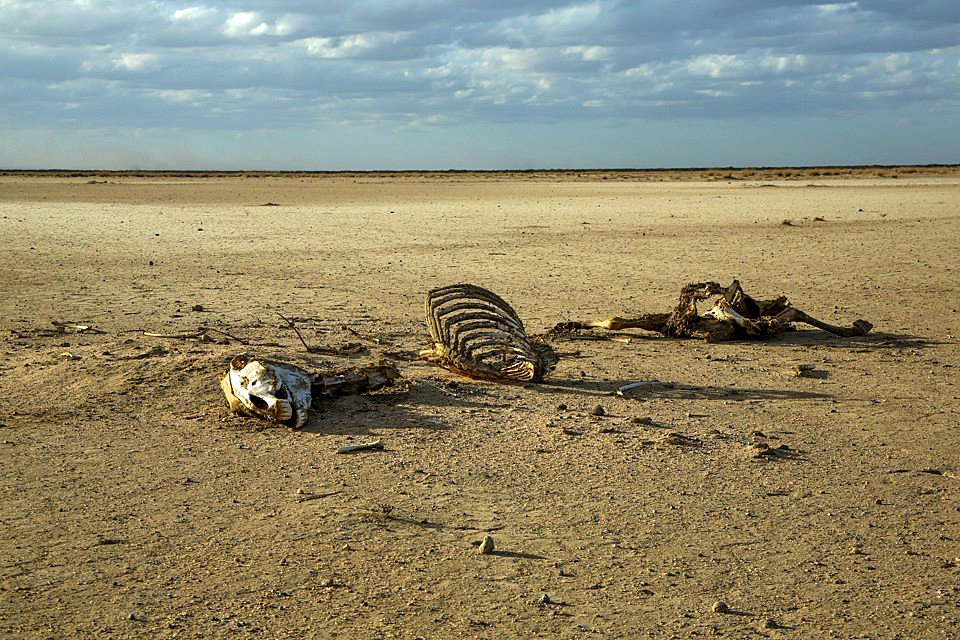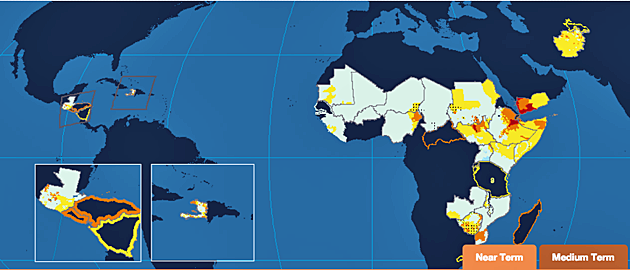PBS: Escaping Eritrea … [Read More...] about ካብ ውሽጢ ቤት ማእሰርታት ኤርትራ
How to See a Famine Before It Starts
Robinson Meyer |
The U.S. government can predict food insecurity before it occurs. But the warnings aren’t always heeded.

He made an unusual pitch.
“We face unrelenting humanitarian needs around the world. Many are generated by conflict and displacement. These human-made crises are extremely difficult to resolve and can last for years or even decades,” said Ban.
But the emergency in Ethiopia was different, he said: “We know it will pass, and the situation will improve. This crisis will end.”
This made providing help now especially important, he said.
Many experts are worried that 2016 will be an unusually bad year for hunger around the world. El Niño brings pleasant if disconcertingly warm weather to North America, but its consequences elsewhere in the world can be far more devastating. In addition to eastern Africa, rains have so far failed or faltered this year in Central America, parts of the Caribbean, and southern Africa.

“It is not a computer program, it is not a quantitative modeling process,” says Chris Hillbruner, a senior advisor at FEWSNET. “There really isn’t a mathematical formula that lets you calculate where food security is going. There’s not even a mathematical formula to calculate what current food security is.”
Most of this data isn’t scraped from the Internet. Employees in the field collect the bulk of FEWSNET’s data in person. More than 300 FEWSNET employees work full-time in the 36 presence countries that it follows, collecting information on the ground and advising its central office.
If FEWSNET is an impressive part of the modern world, it’s not because of its unmatched computer power or impressive mathematical rigor. It’s because the entire program is filled with people, touching and handling and creating the data at every step along the way. Yet this data remains clinical: There’s a dissonance between FEWSNET’s clean color-classification system and the devastating upheaval of lived food-insecurity.
Hillbrunner said he doesn’t expect Ethiopia to enter famine-stage during this crisis. The worst things may get, he said, is stage four. I asked him to describe what stages three and four meant for families on the ground.
He described a “two-basket” system that FEWSNET looks at when it makes its estimate. The first is a basket that includes the costs of survival: food, water, and shelter. The second encompasses investments a family needs to make to continue its livelihood. These include school fees, buying seeds, and feeding cattle.
Which is to say that even when there is not a technical famine, a food-insecurity emergency can be catastrophic. Civil-society groups such as Oxfam, despite being underfunded for the current crisis, have already begun responding. Throughout Ethiopia in particular, they have distributed water, cash, and occasionally food. (Since food insecurity is more about food being too expensive, versus it being unavailable, cash transfers allow local economies to continue functioning until food prices fall.)
A perk of early-warning systems like FEWSNET, too, is that civil groups can prepare for crises before they happen, and position food and water nearby ahead of time. That’s especially important in years like this one, when the world’s humanitarian-response infrastructure will be extremely stretched.
“We expect that 2016 is going to be a very difficult year with atypical levels of food security in a variety of areas,” Hillbruner told me. FEWSNET sees two different types of crises leading to such dire need.
Now, the U.S. estimates at least 10 million people will likely receive food assistance before the emergency ends. That figure is on top of the 7 million people already supported by the Ethiopian government’s domestic food-assistance program. At the same meeting as Ban Ki-moon made his address, the United States pledged an additional $97 million in emergency aid on Sunday.
FEWSNET’s current estimate is that about 40 million people will need emergency food assistance in 2016, a 30 percent increase from 2015 totals.
Despite the efficacy of early-warning systems, politics can thwart them. Five years ago, many experts who pay attention to food scarcity around the world started saying alarming things about the Horn of Africa. Due to a La Niña current in the Pacific, they said, one rainy season after another in the region was failing. Food in the area was getting more and more expensive, and more and more scarce.
In August 2010, FEWSNET issued a report saying that the summer rains had failed to appear in the region. FEWSNET expected food to become more scarce, especially in Somalia. It did, and again in December, FEWSNET warned that it expected “increased mortality” in the region because of the droughts. The death toll began to rise. Finally, in March 2011, another FEWSNET report said that if the spring rains failed, areas of Somalia were destined for famine.
Mortality spiked in May of that year. A famine was declared in Somalia in July. Unlike a food-insecurity emergency, which can be declared ahead of time, a famine declaration requires evidence that many people have already died. Famines are only declared retrospectively. The summer of 2011 was the first time a famine had been declared while the crisis was still in-progress.
Why was the famine not prevented? Thanks to the local militant group Al-Shabaab—and U.S. laws preventing humanitarian groups from interacting with it—food did not reach many areas of Somalia in time or at all.
But the large governments that fund humanitarian groups also did not respond fast enough to other areas in crisis, even if those places never reached famine-stage. Both Oxfam and the British government have said that “a dangerous delay” characterized developed-nation responses to the early-warning systems. Aid didn’t reach Somalia thanks to Al-Shabaab—but it didn’t get to regions of Ethiopia, Kenya, and Djibouti because FEWSNET wasn’t heeded.
Despite the knowledge that a famine was coming, 260,000 people in the region—half of them children—died.
Are there other ways to detect and respond to food insecurity?
Nine African nations, though not Ethiopia, have pioneered a program called African Risk Capacity (ARC) through the African Union. ARC is an early-warning system for drought tied to an insurance company. If the early-warning goes off, then the insurance fund disburses.
“The mandate of ARC is to improve the way we respond to current, predictable disasters that members face, especially when it comes to food security, drought, flood, etc.,” said Joanna Syroka, the director of research at ARC.
These kinds of disasters have a certain pattern, she said: “We know they happen, we know they’ll happen again, and they’re very evident when they’re happening.”
ARC differed even from other sovereign insurance programs, she said, because they “care what happens to the money.”
“You need a plan, you need a contingency plan. When you’re acting early and you have money, what am I going to do with that money to make sure it reaches people?,” she said. “We’re not talking about [famine]. We’re talking about, just as the rains fail, just as the drought is coming in, responding to people then, as early as possible, before they start selling their productive assets, before they start pulling their kids out of school or skipping meals.”
Ethiopia is not part of ARC and has its own crop-insurance programs; even without historic drought, that program will support millions of people per year. But ARC hints at other ways that early-warning systems can work. FEWSNET is one of the oldest early-warning systems running. Others now exist for different kinds of disaster: The United States Holocaust Memorial Museum runs an alert system for genocide and other mass atrocities, for instance.
As more and more programs claim to do the same, we will recognize that stopping disaster requires more than detecting it ahead of time. If anything, detecting it ahead of time is easy. Even with perfect knowledge, those with the power to intervene must decide whether it is worth it to act. It is a decision, especially in non-military situations, that we in the rich world have not practiced.
